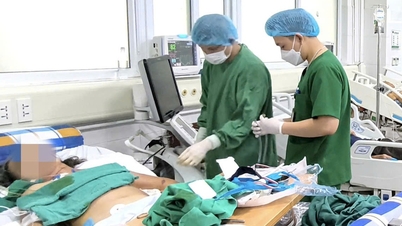
For more than a year, Mr. L.D.N. (38 years old, Hanoi ) has been constantly facing a state of intense thirst, having to drink over 10 liters of water every day but still not feeling enough. At the same time, the frequency of urination has increased abnormally, averaging 10 - 15 times/day, even at night having to wake up every 2 hours to urinate.
These symptoms persist, causing the patient to fall into a state of fatigue and disrupting his daily life. Notably, Mr. N's weight increased by 30kg within 2 years.
Faced with the unusual condition, the patient went to Medlatec Tay Ho General Clinic for examination. Here, during the clinical examination and history taking, the patient said that he had had surgery for a craniopharyngioma in 2023. The doctor ordered the patient to perform some necessary paraclinical techniques to serve the diagnosis.
The image of the sella-suprasellar region showed that after surgery for craniopharyngioma, there was no localized mass. The results of the diagnostic imaging also recorded some white matter degeneration of the right frontal lobe (Fazekas 1), old lesions in the right temporal region, mild dilatation of the right lateral ventricle temporal horn, and right mastoid sinusitis. In particular, the results of the blood sodium test increased, showing increased blood osmotic pressure and decreased urine osmotic pressure.
From the clinical symptoms and diagnosis results, the doctors concluded that the patient had post-operative pituitary insufficiency after craniopharyngioma surgery. The doctor prescribed medication for the patient, as well as changes in lifestyle and attention to daily nutrition.
After 2 weeks of treatment, the patient's thirst was reduced, the amount of water per day was about 2.5 - 3 liters, the number of times of urination decreased to 2-3 liters/day (about 6-8 times/day). The patient continued to maintain the treatment regimen and return for check-ups as scheduled.
N.'s case shows that diabetes insipidus does not appear independently but is part of the complication of pituitary insufficiency after craniopharyngioma surgery. When the pituitary gland is damaged, antidiuretic hormone (ADH) decreases, causing the body to not retain water, thereby causing constant thirst, frequent urination and dilute urine.
In parallel, endocrine tests recorded many decreased indices such as LH, FSH, testosterone, FT4, reflecting the decline in pituitary function. This confirmed the close relationship between the two endocrine disorders: diabetes insipidus is the prominent clinical manifestation, while pituitary failure is the underlying cause.
According to Master, Doctor Nguyen Quynh Xuan - Head of Endocrinology, Medlatec Healthcare System, this case is also a warning: seemingly simple symptoms such as frequent thirst and prolonged urination can hide complex endocrine diseases. Proactively visiting reputable medical facilities will help patients receive accurate diagnosis and timely treatment, avoiding dangerous complications.
Source: https://nhandan.vn/phat-hien-suy-tuyen-yen-tu-dau-hieu-khat-nuoc-lien-tuc-post913439.html




![[Photo] Prime Minister Pham Minh Chinh chairs the 16th meeting of the National Steering Committee on combating illegal fishing.](https://vphoto.vietnam.vn/thumb/1200x675/vietnam/resource/IMAGE/2025/10/07/1759848378556_dsc-9253-jpg.webp)




















![[Photo] Prime Minister Pham Minh Chinh chairs the 16th meeting of the National Steering Committee on combating illegal fishing.](https://vphoto.vietnam.vn/thumb/402x226/vietnam/resource/IMAGE/2025/10/07/1759848378556_dsc-9253-jpg.webp)


![[Photo] Super harvest moon shines brightly on Mid-Autumn Festival night around the world](https://vphoto.vietnam.vn/thumb/1200x675/vietnam/resource/IMAGE/2025/10/07/1759816565798_1759814567021-jpg.webp)




































































Comment (0)